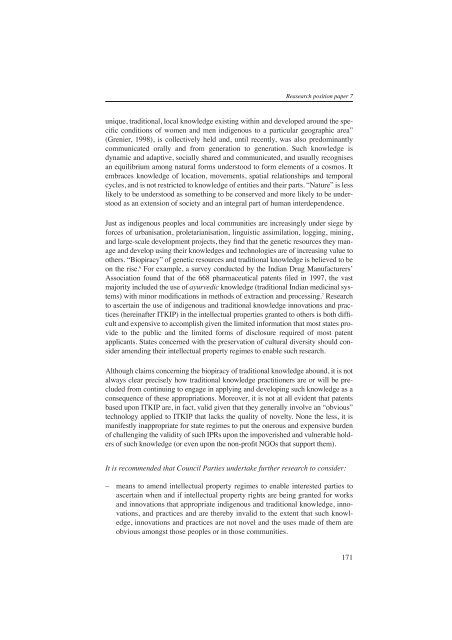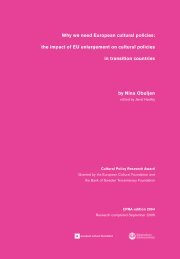<strong>Differing</strong> <strong>diversities</strong>The relationship between cultural diversity and biodiversityHuman cultural diversity, it is believed, is threatened on an unprecedented scale(Posey, 2000: 3). Languages are generally seen as major indicators <strong>of</strong> culturaldiversity – the codifications, heritages, and frameworks which constitute a society’sunique understanding <strong>of</strong> the natural and social world. An estimated half <strong>of</strong>these will disappear within the next century (Unesco, 1993). Since 4000 to 5000<strong>of</strong> the 6000 languages in the world are spoken by indigenous peoples, and theseare the most endangered <strong>of</strong> languages, the loss <strong>of</strong> cultural diversity will affectthese peoples disproportionately. The countries which contain peoples speakingthe largest numbers <strong>of</strong> languages are also those that house the greatest biologicaldiversity in terms <strong>of</strong> species and variations in interspecies, and include the greatestnumbers <strong>of</strong> indigenous peoples and communities with traditional, near-subsistencelivelihoods. Although no universally accepted definition <strong>of</strong> indigenous peoplesor <strong>of</strong> traditional communities exists, the majority <strong>of</strong> the world’s ruralpopulations live in direct dependence upon their knowledge <strong>of</strong> and use <strong>of</strong> localecosystem resources. These resources are also disappearing at an alarming ratewith dire consequences for those peoples whose livelihoods depend upon them. 2The world’s poor rely upon biological products from local sources for 85% <strong>of</strong> theirneeds (for example, for food, fuel, shelter, medicine, etc.), over 1.4 billion rural peoplerely upon farm-saved seeds and local plant breeding for their subsistence, morethan three quarters <strong>of</strong> the world’s population relies on the knowledge <strong>of</strong> local healthpractitioners and traditional medicines for their primary medical needs, and over half<strong>of</strong> the world’s drugs are derived from plants (Crucible II Group, 2000: 1). New plantgenetic resources are needed in the pharmaceutical, agricultural, and biotechnologicalindustries on a regular basis, yet the social and cultural conditions that nurturetheir ongoing development and ensure their continuing variation are threatened.Plant genetic diversity is considered a human legacy but it is one that is sustainedlargely by the uncompensated work <strong>of</strong> culturally diverse, politically vulnerable,and impoverished peoples. 3Only to the extent that such practices are supported, encouraged, and maintainedby in situ conservation measures will biodiversity be maintained. 4 Hence, the CBDpreamble recognises the “close and traditional dependence <strong>of</strong> many indigenousand local communities embodying traditional lifestyles on biological resources,and the desirability <strong>of</strong> sharing equitably benefits arising from the use <strong>of</strong> traditionalknowledge, innovations and practices relevant to the conservation <strong>of</strong> biologicaldiversity and the sustainable use <strong>of</strong> its components”. This is indicative <strong>of</strong> a globalrecognition that biodiversity preservation is an inherently multicultural process.Indigenous knowledges may be understood as the cultural knowledges <strong>of</strong> local peoplesconcerning the everyday realities <strong>of</strong> living that are the product <strong>of</strong> a direct experiencewith nature and a particular, local ecosystem. 5 Indigenous knowledge, “the170
Reasearch position paper 7unique, traditional, local knowledge existing within and developed around the specificconditions <strong>of</strong> women and men indigenous to a particular geographic area”(Grenier, 1998), is collectively held and, until recently, was also predominantlycommunicated orally and from generation to generation. Such knowledge isdynamic and adaptive, socially shared and communicated, and usually recognisesan equilibrium among natural forms understood to form elements <strong>of</strong> a cosmos. Itembraces knowledge <strong>of</strong> location, movements, spatial relationships and temporalcycles, and is not restricted to knowledge <strong>of</strong> entities and their parts. “Nature” is lesslikely to be understood as something to be conserved and more likely to be understoodas an extension <strong>of</strong> society and an integral part <strong>of</strong> human interdependence.Just as indigenous peoples and local communities are increasingly under siege byforces <strong>of</strong> urbanisation, proletarianisation, linguistic assimilation, logging, mining,and large-scale development projects, they find that the genetic resources they manageand develop using their knowledges and technologies are <strong>of</strong> increasing value toothers. “Biopiracy” <strong>of</strong> genetic resources and traditional knowledge is believed to beon the rise. 6 For example, a survey conducted by the Indian Drug Manufacturers’Association found that <strong>of</strong> the 668 pharmaceutical patents filed in 1997, the vastmajority included the use <strong>of</strong> ayurvedic knowledge (traditional Indian medicinal systems)with minor modifications in methods <strong>of</strong> extraction and processing. 7 Researchto ascertain the use <strong>of</strong> indigenous and traditional knowledge innovations and practices(hereinafter ITKIP) in the intellectual properties granted to others is both difficultand expensive to accomplish given the limited information that most states provideto the public and the limited forms <strong>of</strong> disclosure required <strong>of</strong> most patentapplicants. States concerned with the preservation <strong>of</strong> cultural diversity should consideramending their intellectual property regimes to enable such research.Although claims concerning the biopiracy <strong>of</strong> traditional knowledge abound, it is notalways clear precisely how traditional knowledge practitioners are or will be precludedfrom continuing to engage in applying and developing such knowledge as aconsequence <strong>of</strong> these appropriations. Moreover, it is not at all evident that patentsbased upon ITKIP are, in fact, valid given that they generally involve an “obvious”technology applied to ITKIP that lacks the quality <strong>of</strong> novelty. None the less, it ismanifestly inappropriate for state regimes to put the onerous and expensive burden<strong>of</strong> challenging the validity <strong>of</strong> such IPRs upon the impoverished and vulnerable holders<strong>of</strong> such knowledge (or even upon the non-pr<strong>of</strong>it NGOs that support them).It is recommended that <strong>Council</strong> Parties undertake further research to consider:– means to amend intellectual property regimes to enable interested parties toascertain when and if intellectual property rights are being granted for worksand innovations that appropriate indigenous and traditional knowledge, innovations,and practices and are thereby invalid to the extent that such knowledge,innovations and practices are not novel and the uses made <strong>of</strong> them areobvious amongst those peoples or in those communities.171
- Page 5 and 6:
PrefaceThe present text constitutes
- Page 7:
Part IDiffering diversities:transve
- Page 11 and 12:
The study: background, contextand m
- Page 13 and 14:
Transversal study on the theme of c
- Page 15:
Transversal study on the theme of c
- Page 18:
Differing diversitiesi. new forms o
- Page 23 and 24:
IntroductionTransversal perspective
- Page 25 and 26:
Transversal study on the theme of c
- Page 27 and 28:
The challenge of diversityCulture,
- Page 29 and 30:
Transversal study on the theme of c
- Page 31 and 32:
Transversal study on the theme of c
- Page 33 and 34:
Diversity, citizenship, and cultura
- Page 35 and 36:
Transversal study on the theme of c
- Page 37:
Transversal study on the theme of c
- Page 40 and 41:
Differing diversitieslanguages. The
- Page 42 and 43:
Differing diversitiesprogrammes int
- Page 45 and 46:
Culture, government and diversity:p
- Page 47 and 48:
Transversal study on the theme of c
- Page 49 and 50:
Transversal study on the theme of c
- Page 51 and 52:
Transversal study on the theme of c
- Page 53:
Transversal study on the theme of c
- Page 56 and 57:
Differing diversitiesin the pursuit
- Page 58 and 59:
Differing diversitiesthe need for m
- Page 60 and 61:
Differing diversitiescircumstances
- Page 62 and 63:
Differing diversitiesclasses artist
- Page 64 and 65:
Differing diversitiesMy point, then
- Page 66 and 67:
Differing diversitiesiii. that the
- Page 69:
Transversal study on the theme of c
- Page 73 and 74:
The consequences of European media
- Page 75 and 76:
Reasearch position paper 1and contr
- Page 77 and 78:
Reasearch position paper 1directly
- Page 79 and 80:
Reasearch position paper 1There hav
- Page 81 and 82:
Reasearch position paper 1presence
- Page 83 and 84:
Reasearch position paper 1Strategic
- Page 85 and 86:
Reasearch position paper 1New media
- Page 87 and 88:
Reasearch position paper 1Blumler,
- Page 89 and 90:
Reasearch position paper 1Hoffmann-
- Page 91 and 92:
Reasearch position paper 1Pauwels,
- Page 93 and 94:
Assessing the implementationof cult
- Page 95 and 96:
Reasearch position paper 2tics abou
- Page 97 and 98:
Reasearch position paper 2Act (GPRA
- Page 99 and 100:
Reasearch position paper 2factually
- Page 101 and 102:
Reasearch position paper 2The evalu
- Page 103 and 104:
Reasearch position paper 2capacity
- Page 105 and 106:
Reasearch position paper 2Luchtenbe
- Page 107 and 108:
The cultural policies of the Europe
- Page 109 and 110:
Reasearch position paper 3went, wou
- Page 111 and 112:
Reasearch position paper 3The histo
- Page 113 and 114:
Reasearch position paper 3integrati
- Page 115 and 116:
Reasearch position paper 3of differ
- Page 117 and 118:
Reasearch position paper 3European
- Page 119 and 120: Reasearch position paper 3voice to
- Page 121: Reasearch position paper 3Howe, Mar
- Page 124 and 125: Differing diversitiesContemporary d
- Page 126 and 127: Differing diversitiesWhereas in the
- Page 128 and 129: Differing diversitiesbuilding on th
- Page 130 and 131: Differing diversitieswhen tackling
- Page 132 and 133: Differing diversitiesand that is pr
- Page 134 and 135: Differing diversitiesSennett, Richa
- Page 136 and 137: Differing diversitiesallowing their
- Page 138 and 139: Differing diversitiesNevertheless,
- Page 140 and 141: Differing diversitiesgrowth also ex
- Page 142 and 143: Differing diversitiesAt a deeper le
- Page 144 and 145: Differing diversitiesconventional c
- Page 146 and 147: Differing diversitiesworks, and the
- Page 148 and 149: Differing diversitiesNational sover
- Page 150 and 151: Differing diversitiesSimilarly, at
- Page 152 and 153: Differing diversitiesCoombe, Rosema
- Page 154 and 155: Differing diversitiesWoodmansee, Ma
- Page 156 and 157: Differing diversitiesIndeed, which
- Page 158 and 159: Differing diversitiesThe second maj
- Page 160 and 161: Differing diversitiesexample by Hol
- Page 162 and 163: Differing diversitiesincreased broa
- Page 164 and 165: Differing diversities“Black Carib
- Page 166 and 167: Differing diversitiesBunt, Gary, 19
- Page 169: Preserving cultural diversity throu
- Page 173 and 174: Reasearch position paper 7legislati
- Page 175 and 176: Reasearch position paper 7appropria
- Page 177 and 178: Reasearch position paper 7Indeed, m
- Page 179 and 180: Reasearch position paper 7- means t
- Page 181 and 182: Reasearch position paper 7cyberspac
- Page 183 and 184: Reasearch position paper 7extended
- Page 185 and 186: Reasearch position paper 7It is rec
- Page 187 and 188: Reasearch position paper 7lose loca
- Page 189 and 190: Reasearch position paper 7six proje
- Page 191 and 192: Reasearch position paper 7and innov
- Page 193 and 194: Reasearch position paper 7Programme
- Page 195 and 196: Reasearch position paper 7Reference
- Page 197 and 198: Reasearch position paper 7Papers on
- Page 199: Reasearch position paper 7Swaminath
- Page 202: Sales agents for publications of th














